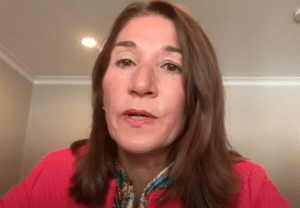Who is a member?
Our members are the local governments of Massachusetts and their elected and appointed leadership.

Lt. Gov. Karyn Polito speaks with mayors and town managers during a Zoom meeting about the surge of migrants and an already overburdened emergency shelter system on Oct. 31.
With a surge of migrants and an already overburdened emergency shelter system, state officials explained yesterday that they are having to place families in hotels and motels in communities around the state on very short notice and that the situation is expected to worsen in the coming months.
In a Zoom meeting hosted by the MMA with mayors and town managers, 14 state officials, including Lt. Gov. Karyn Polito, explained the emergency situation and sought feedback and cooperation from cities and towns as they refine their plans.
“At this point we’re seeing a capacity strain on our shelter system,” Polito said, “and so emergency activation of space is needed to address the incoming flow of immigrants.”
The surprise arrival of 50 Venezuelan migrants on Martha’s Vineyard grabbed national headlines in September, but they weren’t the only ones. State officials said the flow of migrants to Massachusetts continues, in some cases after they have been bussed from the southern border to places like Washington, D.C., and Chicago.
Over the past calendar year, Massachusetts has received about 1,000 families who are refugees, migrants or asylum seekers, said Health and Human Services Secretary Marylou Sudders, and “that pace will probably double” over the next year to 18 months due to the situation at the U.S. southern border and the unrest in other nations.
In a growing number of cases, Sudders said, migrants are going to hospital emergency rooms in search of shelter. She said one Boston medical center saw more than 70 families during the month of October, primarily from Haiti but also from the Dominican Republic, Ecuador and Colombia.
Meanwhile, the state’s 3,600 family shelter units are all occupied, in part because residents have been taking longer to exit the system due to the state’s tight housing market, according to Adam Schaffer, deputy director of the Division of Housing Stabilization.
“We have exhausted all of our existing traditional shelter units,” he said. “In the interim, we’re using hotels and motels to put families that truly do not have a safe place to sleep that night.”
As a “right-to-shelter” state, Massachusetts officials must provide temporary emergency shelter to every eligible family, typically within a matter of hours. (Only two other U.S. jurisdictions have right-to-shelter mandates: New York City and Washington, D.C.)
“This is an emergency situation, and we don’t have a lot of lead time,” said Jennifer Maddox, undersecretary of the Department of Housing and Community Development. “If we are looking at potential hotel rooms or expanded congregate sites in your community, we will let you know with as much advance notice as possible.”
Maddox said the Department of Elementary and Secondary Education will also notify superintendents in affected school districts. She said a child’s current school district is taken into consideration in the placement process.
Education Secretary James Peyser reminded local officials that homeless families “have a right to enrollment” in a public school.
The emergency placements are impacting local school systems and human service agencies, which have limited funding and capacity. Local leaders expressed concerns about notification, as well as the impacts on school districts — including student transportation obligations — and existing homeless populations.
State and local leaders talked about ways to improve emergency planning, and ways the state can help cities and towns accommodate the unexpected demands for services. Polito said the conversation will be ongoing within the administration and with local leaders about mustering the necessary resources — including education funding — to address the emergency. She said additional information will be shared through the MMA.
Polito said Gov. Charlie Baker sent a letter yesterday to federal officials seeking help with the migrant situation and “to outline that the federal government has certain levers they can pull, including helping waive requirements to allow these individuals to access work more quickly and to become more self-sufficient and not dependent on these emergency services.”
In his letter to Homeland Security Secretary Alejandro Mayorkas and Health and Human Services Secretary Xavier Becerra, Baker wrote, “Massachusetts is proud to welcome individuals and families seeking asylum and refuge and is dedicated to helping families live with dignity, but additional federal support is required.”
The governor took issue with a system that offers more resources and support to migrants arriving from places like Afghanistan and Ukraine than Haiti and Cuba.
Upon taking office in 2015, the Baker-Polito administration launched a concerted effort to move more than 1,500 individuals from temporary placements in hotels and motels to designated shelters. At the time, local school districts had been facing exorbitant costs to transport homeless students to the district they had been attending before they became homeless. The restart of using hotel and motels as emergency housing has school districts once again facing the busing challenges and costs.
Schaffer said Massachusetts will need “several hundred” additional shelter units over next year.
“We’re actively working to expand capacity through existing congregate sites as well as asking our providers to find additional apartments,” he said.
In response to questions, Schaffer said his agency has strategies for helping providers get certain facilities — such as space in a local church — up to state building code standards quickly for housing, and his agency would work to help local officials do so.
Schaffer said his agency should be the first point of contact for local officials with questions. In cases of unexpected arrivals (e.g., a large number of migrants arrive by bus), contact Emily MacCormack at Emily.chabot2@mass.gov. Family shelter questions can be directed to Schaffer at Adam.Schaffer2@mass.gov, Alvina Brevard at alvina.brevard@mass.gov, or Tyler Newhall at Tyler.Newhall@mass.gov.